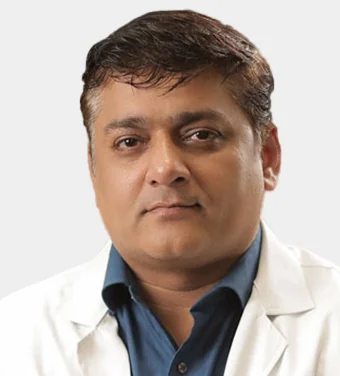
Our Paediatric Orthopaedics Unit at IBS Hospital offers exceptional care for children. The specialized team diagnoses, treats, and manages a wide range of conditions using advanced methods. With cutting-edge technology, dedicated units, and family- centered care, we ensure the best outcomes for your child’s recovery and well-being.
What is Pediatric Orthopedics?
Paediatric Orthopaedics is a specialized branch of orthopaedic treatment that focuses on diagnosing, treating, and managing musculoskeletal conditions, injuries, and deformities in children. It involves a wide range of issues such as bone and joint disorders, fractures, spine deformities, limb length differences, and gait abnormalities. Paediatric orthopaedic surgeons are trained to provide comprehensive care for children, from newborns to adolescents, ensuring their musculoskeletal health and proper growth.
What are the common musculoskeletal conditions treated in Pediatric Orthopedics?
Our experts specialize in the diagnosis, treatment and management of Structural/ functional deformities, as well as gait related anomalies. Common conditions that can be managed by our experts include:
- Foot-Related Problems: Metatarsus adductus, Calcaneovalgus foot, Planovalgus deformity, Tarsal coalition, and Hypermobile pes planus.
- Toe-Related Problems: Curly toes, Overlapping fifth toe, Polydactyly, Claw toes, Mallet toes, and Hammer’s toe.
- Leg-Related Problems: Internal femoral torsion, Internal tibial torsion, External tibial torsion, and Leg length discrepancy.
- Knee-Related Problems: Popliteal cysts, Osteochondritis dissecans, Patellar subluxation, and dislocation, and Discoid lateral meniscus.
- Hip-Related Problems: Hip dysplasia, Septic arthritis, Perthes’ disease, Slipped capital femoral epiphysis, and dislocation.
- Spine-Related Problems: Scoliosis, Discitis, Kyphosis, and Spondylosis.
- Neck-Related Problems: Torticollis and Atlanto-axial instability.
- Shoulder-Related Problems: Sprengel’s deformity.
- Elbow-Related Problems: Nursemaid’s elbow and Panner’s disease.
- Wrist-Related Problems: Ganglion and Radial club hand
What innovative approaches are used to treat Spine-Related issues in young patients?
At IBS Hospital, we emphasize that DBS isn’t suitable for everyone. Our approach typically considers:
- Minimally Invasive Surgery (MIS): Utilizing smaller incisions and advanced technology, MIS reduces trauma to surrounding tissues, leading to quicker recovery and less post- operative discomfort.
- Growing Rods: Adjustable rods are implanted to guide spinal growth in children with scoliosis, allowing for periodic lengthening to accommodate growth.
- Vertebral Body Tethering (VBT): A novel technique involving tethering screws to guide spinal growth and correct curvature in a more flexible manner.
- Early Intervention Programs: Customized exercise regimens and physical therapies are designed to address spinal issues in their early stages, promoting proper development.
- Neuromonitoring: Real-time nerve monitoring during surgery enhances safety, reducing the risk of neurological complications during spinal procedures.
- Motion-Preserving Techniques: Implementing procedures that maintain spinal mobility while addressing issues like scoliosis, preserving natural movement and flexibility.
- Regenerative Therapies: Emerging treatments like stem cell therapy aim to promote healing and regeneration of damaged spinal tissues in young patients.
Can Pediatric Orthopedic conditions be treated without Surgery?
Yes, non-surgical treatment options play a significant role in managing paediatric orthopaedic conditions, offering effective alternatives to surgical intervention.
Depending on the specific condition and its severity, orthopaedic specialists often recommend conservative approaches that prioritize the childs growth and development. These non-surgical options include:
- Physical Therapy: Customized exercise programs help improve muscle strength, joint flexibility, and overall function,aiding in the correction of various musculoskeletal issues.
- Orthotic Devices: Braces, splints, or shoe inserts are employed to support proper alignment, correct deformities, and;promote healthy bone and joint development.
- Activity Modification: Adjusting daily activities and sports participation can help prevent further strain or injury, allowing the body to heal naturally.
- Medications: Prescription or over-the- counter medications may be used to manage pain, inflammation, or specific underlying conditions.
- Traction: Controlled pulling forces applied to bones and joints can aid in correcting alignment issues, particularly in cases of leg- length discrepancies.
- External Fixation: Devices worn externally on the body can guide bone growth and alignment, particularly for limb deformities.
- Weight Management: Maintaining a healthy weight is crucial for preventing additional stress on bones and joints, allowing for proper growth.
- Parental Education: Educating parents and caregivers on proper techniques for managing the condition at home can contribute to the childs overall well-being.
Our team of experts that make it possible
Meet the team of highly specialised and experienced neurosurgeons, neurologists, orthopedicians, and other experts in the field of neurology and spine care. Our team is dedicated to providing personalised and compassionate care to each patient, with the goal of helping them achieve the best possible outcomes.
IBS Hospital Empowers Your Treatment with Cutting-edge Technology
We continuously incorporate cutting-edge technologies from around the world into our offerings, such as a surgical system that allows for precise and confident complex procedures. We use magnetic stimulation to treat certain neurological conditions and create personalised brain maps for tailored treatment plans. Nerve monitoring during surgeries ensures the nervous system is not compromised, and a robotic exoskeleton aids in mobility issues. Our goal at IBS Hospital is to provide the best care possible, utilising the latest and most innovative technologies available.






